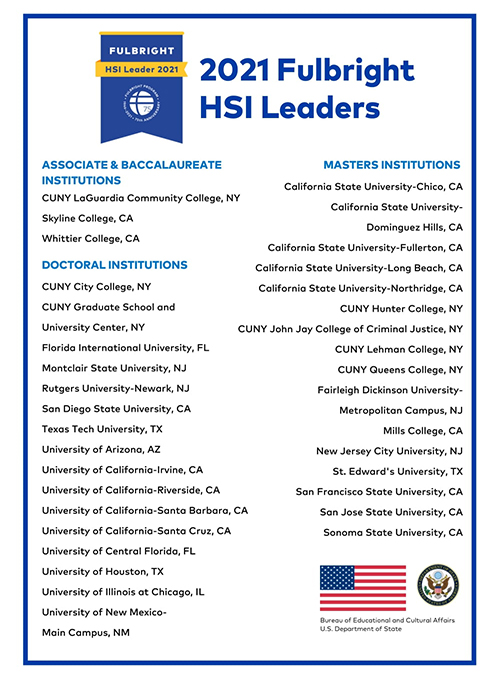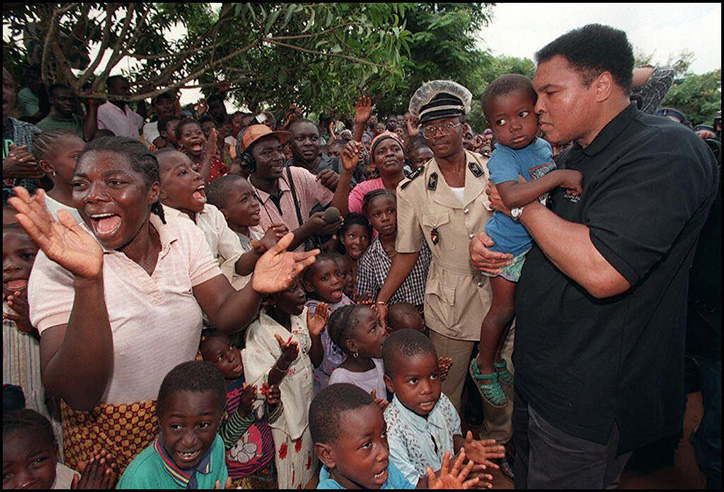The U.S. Department of State’s Bureau of Educational and Cultural Affairs (ECA) is pleased to announce a new initiative recognizing the strong engagement of Hispanic-Serving Institutions (HSIs) with the Fulbright Program. Through this inaugural “Fulbright HSI Leader” designation, ECA recognizes 35 HSIs that have demonstrated noteworthy engagement with the Fulbright Program during the 2019-2021 academic years and have promoted Fulbright Program opportunities on campus.
The inaugural Fulbright HSI Leaders were announced today, October 27, 2021, during the international plenary session at the annual conference of the Hispanic Association of Colleges and Universities (HACU). The honored colleges and universities include three Associate and Baccalaureate Institutions, 16 Masters Institutions, and 16 Doctoral Institutions.
This initiative is part of the U.S. State Department’s long-standing commitment to build diversity and inclusion within the Fulbright Program and within all the Bureau’s international exchange programs. ECA has established this designation to acknowledge the strong partnerships between the Fulbright Program and HSIs, and to encourage the entire network of HSIs to increase their Fulbright engagement. Having strong HSI participation in the U.S. government’s flagship international exchange program is critical to fully representing the diversity of the United States through the Program. ECA congratulates the 35 institutions on achieving this new honor.
On July 28, 2021, Secretary of State Antony Blinken and Secretary of Education Miguel Cardona released a “Joint Statement of Principles in Support of International Education,” which outlines the many benefits of international education and the need for “all Americans [...] to be equipped with global and cultural competencies.” The Fulbright HSI Leaders Initiative supports the goals of the Joint Statement, including the principle that U.S. participants in international exchanges should reflect the diversity of the United States.
Deputy Assistant Secretary of State for Academic Programs Ethan Rosenzweig, speaking on behalf of ECA, which sponsors the Fulbright Program, congratulated and thanked the leadership of the designated institutions for recognizing the impact of the Fulbright Program, saying, “Thank you for creating a campus culture that celebrates the mission of Fulbright and international exchanges. Thank you for epitomizing the principle that mutual understanding between peoples of the United States and other countries will lead to a more just and peaceful society at home.” He also praised the faculty, staff, and administrators on campus who recruit, advise and support future Fulbrighters throughout the application process, stating that their work represents “why we all come to our jobs each and every day. . .to ensure our students have every opportunity to excel beyond goals they may not have believed were ever obtainable.”
Seven of the 35 Fulbright HSI Leaders are part of the City University of New York (CUNY). Dr. Félix V. Matos Rodríguez, CUNY Chancellor, praised the Fulbright Program for its “solid record of recruiting and selecting people from diverse backgrounds and helping to ensure that those individuals have successful and rewarding experiences abroad.” Rodríguez, who is also a member and past chair of the HACU Board of Governors, as well as a member of HACU’s Commission on International Education, went on to say, “I salute the State Department for launching this Fulbright HSI Leaders Initiative, to build on that record by expanding the representation of HSIs in the Fulbright Program.”
The Fulbright Program’s robust diversity strategies and initiatives have included collaboration with diversity-related associations and organizations such as the Hispanic Association of Colleges and Universities (HACU); the White House Initiative on Advancing Educational Excellence, Equity, and Economic Opportunity for Hispanics; the White House Initiative on Historically Black Colleges and Universities; the National Clearinghouse on Disability and Exchange; the American Association of Community Colleges; Diversity Abroad; and many more. The Program also works with diversity-focused media outlets and is engaged with minority serving institutions and other diverse colleges and universities. The Fulbright Program is keenly aware that its efforts to increase and enhance diversity must necessarily be coupled with inclusion. The Program has taken measures to help ensure that all participants have successful and rewarding exchange experiences.
This year marks the 75th Anniversary of the Fulbright Program. Celebrations throughout the year are highlighting the impressive accomplishments and legacy of the program and its alumni over its first 75 years, both in the United States and around the world. A dedicated 75th anniversary website (https://fulbright75.org) showcases Fulbright alumni, partners, and anniversary events.
The Fulbright Program was created to increase mutual understanding between the people of the United States and the people of other countries. The primary source of funding for the Fulbright Program is an annual appropriation made by the U.S. Congress to the U.S. Department of State’s Bureau of Educational and Cultural Affairs.
Fulbright is active in more than 160 countries worldwide and partners with governments, host institutions, corporations, and foundations in foreign countries and in the United States. Many of these organizations also provide direct and indirect support. For further information about the Fulbright Program or the U.S. Department of State, please visit http://eca.state.gov/fulbright.
Associate & Baccalaureate Institutions: CUNY LaGuardia Community College; Skyline College; Whittier College.
Masters Institutions: California State University-Chico; California State University-Dominguez Hills; California State University-Fullerton; California State University-Long Beach; California State University-Northridge; CUNY Hunter College; CUNY John Jay College of Criminal Justice; CUNY Lehman College; CUNY Queens College; Fairleigh Dickinson University-Metropolitan Campus; Mills College; New Jersey City University; Saint Edward's University; San Francisco State University; San Jose State University; Sonoma State University.
Doctoral Institutions: CUNY City College; CUNY Graduate School and University Center; Florida International University; Montclair State University; Rutgers University-Newark; San Diego State University; Texas Tech University; University of Arizona; University of California-Irvine; University of California-Riverside; University of California-Santa Barbara; University of California-Santa Cruz; University of Central Florida; University of Houston; University of Illinois at Chicago; University of New Mexico-Main Campus.











